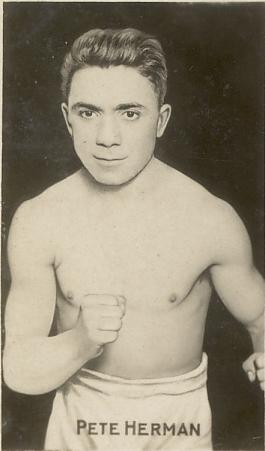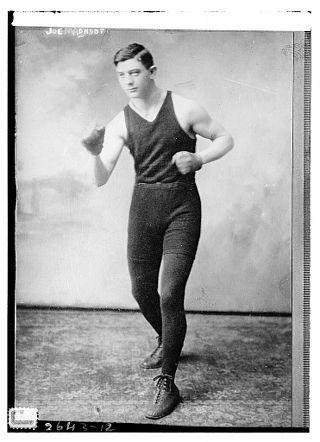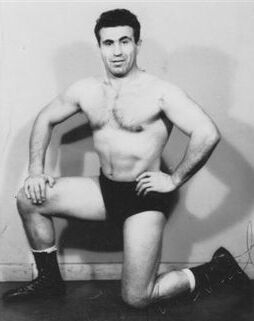
The Caesars Superdome, commonly known as the Superdome, is a domed multi-purpose stadium located in the Central Business District of New Orleans, Louisiana, United States. It is the home stadium of the New Orleans Saints of the National Football League (NFL).

The Greensboro Complex, formerly known as the Greensboro Coliseum Complex, is an entertainment and sports complex located in Greensboro, North Carolina. Opened in 1959, the complex holds eight venues that includes an amphitheater, arena, aquatic center, banquet hall, convention center, museum, theatre, and an indoor pavilion. It is the home of the UNC Greensboro Spartans men's basketball team, the Greensboro Swarm of the NBA G League, the Carolina Cobras of the National Arena League, as well as the Atlantic Coast Conference (ACC) with their Men's and Women's basketball tournaments.

Pete Herman was one of the all-time great bantamweight world champions. An American of Italian heritage and descent, Herman was born Peter Gulotta in New Orleans, Louisiana, and fought from 1912 until 1927. He retired with a record of 69 wins, 11 losses, 8 draws and 61 no-decisions in 149 bouts. His managers were Jerome Gargano, Doc Cutch, Sammy Goldman and Red Walsh. Nat Fleisher, Ring Magazine editor and founder, impressively rated Herman as the #2 best all time bantamweight.

Bojangles Coliseum, originally Charlotte Coliseum and formerly Independence Arena and Cricket Arena, is an 8,600-seat multi-purpose arena located in Charlotte, North Carolina. It is operated by the Charlotte Regional Visitors Authority, which also oversees nearby Ovens Auditorium and the uptown Charlotte Convention Center. The naming-rights sponsor is the Bojangles restaurant chain. The building's signature domed roof is made of tin, rather than steel or iron. The dome spans 332 feet in diameter and rises to 112 feet tall.

The Araneta Coliseum, also currently known by naming rights sponsorship as Smart Araneta Coliseum, is an indoor multi-purpose sports arena that is part of the Araneta City in the Cubao area of Quezon City, Philippines. Nicknamed as "the Big Dome", it is one of the largest indoor arenas in Asia, and one of the largest clear span domes in the world. The dome measures approximately 108.0 meters (354.3 ft) making it the largest dome in Asia from its opening in 1960 until 2001 when it was surpassed by the Ōita Stadium in Japan with a dome measuring 274.0 meters (899.0 ft).

Joe Brown was an American professional boxer who won the world lightweight title in 1956, making 11 successful defenses against 10 contenders before losing his crown to Carlos Ortiz in 1962. Brown was a classic boxer and a knockout puncher. Known as "The Creole Clouter" and "Old Bones", he was managed by Lou Viscusi and named The Ring's 'Fighter of the Year' for 1961. Brown was inducted into the Louisiana Sports Hall of Fame in 1978, the World Boxing Hall of Fame in 1987 and the International Boxing Hall of Fame in 1996.

Avron B. Fogelman Arena in Devlin Fieldhouse is a 4,100-seat, multi-purpose arena built in 1933 on Tulane University's Uptown campus in New Orleans, Louisiana. Since its opening, it has been home to the Tulane Green Wave men's and women's basketball teams and the women's volleyball team. Devlin is the 9th-oldest continuously active basketball venue in the nation.

The Municipal Auditorium is a 7,853-seat multi-purpose arena in New Orleans, Louisiana, and a component of the New Orleans Cultural Center, alongside the Mahalia Jackson Theater of the Performing Arts. It is located in the Tremé neighborhood in Louis Armstrong Park adjacent to Congo Square.

Pelican Stadium, originally known as Heinemann Park (1915–1937), was a sports stadium in New Orleans, Louisiana from 1915 to 1957.

The LSU Tigers and Lady Tigers are the athletic teams representing Louisiana State University (LSU), a state university located in Baton Rouge, Louisiana. LSU competes in Division I of the National Collegiate Athletic Association (NCAA) as a member of the Southeastern Conference (SEC).

The John M. Parker Agricultural Coliseum or John M. Parker Agricultural Center is a 6,756-seat multi-purpose arena in Baton Rouge, Louisiana. It hosts local sporting events, horse shows, livestock shows and concerts.

New Orleans is home to a wide variety of sporting events. Most notable are the home games of the New Orleans Saints (NFL) and the New Orleans Pelicans (NBA), the annual Sugar Bowl, the annual Zurich Classic and horse racing at the Fair Grounds Race Course. New Orleans has also occasionally hosted the Super Bowl, College Football Playoff semifinal game and the NCAA college basketball Final Four.

Danny Little Bear was an American professional wrestler who competed in North American regional promotions including the National Wrestling Alliance, particularly the Central States and Gulf Coast territories, where he remained one of the region's most popular stars during the 1960s and 70s. His feuds with Yasu Fuji & Chati Yokochi, Black Angus Campbell and manager Percival A. Friend and Eduardo Miguel Perez were the cause of frequent riots and arrests in the St. Joseph-Kansas City area during the summer of 1972.

Frankie Burns was a top rated American bantamweight boxer from New Jersey who contended four times for the World Bantamweight Championship between 1912 and 1917, twice meeting Johnny Coulon. Founder of Ring Magazine, Nat Fleischer ranked Burns as the #8 All-Time Bantamweight.

The culture of Louisiana involves its music, food, religion, clothing, language, architecture, art, literature, games, and sports. Often, these elements are the basis for one of the many festivals in the state. Louisiana, while sharing many similarities to its neighbors along the Gulf Coast, is unique in the influence of Louisiana French culture, due to the historical waves of immigration of French-speaking settlers to Louisiana. Likewise, African-American culture plays a prominent role. While New Orleans, as the largest city, has had an outsize influence on Louisiana throughout its history, other regions both rural and urban have contributed their shared histories and identities to the culture of the state.

Joseph Marceline Mandot also known as Baker Boy, was a young featherweight boxer and an accomplished contender for both the world lightweight championship in 1912 and the world welterweight championship in 1915. He fought five world champions in the WWI boxing era, defeating or giving close bouts to each. He was managed in his early career by Billy Walsh, and for a time by Blacky Raggio.

Dick Hrstich was a Yugoslavian/New Zealand professional wrestler, known by his ring names Ray Hrstich and Ray Gordon, who competed in the former Yugoslavia, New Zealand, Canada, and the United States during the late 1950s and 60s. He was among the first New Zealanders to travel to the US and, like his fellow countrymen Pat O'Connor and Abe Jacobs, became a major star with the National Wrestling Alliance during the Television-era.

Herbert Lewis Hardwick Arroyo, also known as "Cocoa Kid", was a Puerto Rican boxer of African descent who fought primarily as a welterweight but also in the middleweight division. Hardwick won the World Colored Championships in both divisions. He was a member of boxing's "Black Murderers' Row" and fought the best boxers of his time. He was inducted into the International Boxing Hall of Fame in 2012.


















